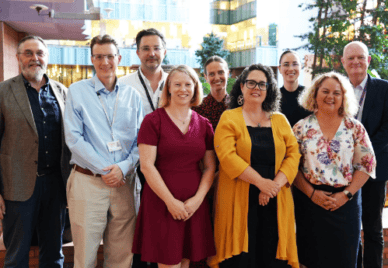
NCRIS Facilities Showcase Cutting-Edge Services for Health Researchers and Industry
Exploreabout NCRIS Facilities Showcase Cutting-Edge Services for Health Researchers and Industry
The COVID-19 pandemic has brought unexpected poignancy and significance to the work of early career researcher Priyanka Pillai.
Priyanka is a Health Informatics Specialist for the Australian Partnership for Preparedness Research on Infection Disease Emergencies (APPRISE) based at the Doherty Institute, which is developing research to inform and improve Australia’s preparedness and response to infectious disease emergencies. Her role includes providing strategic advice to maximise the use and reuse of existing and emerging research datasets.
Priyanka also works for Melbourne Data Analytics Platform, a team of research data specialists and stewards who are focused on enabling data-intensive research across University of Melbourne. She’s helping augment the university’s data management capability by supporting governance for research data and identifying valuable research data assets.
Having expertise in today’s highly topical areas of infectious diseases and data has put new meaning into Priyanka’s work, as she recently explained.
What’s your research background?
I have a Bachelor of Technology in Bioinformatics from the Dr D.Y. Patil Biotechnology and Bioinformatics Institute in Pune, India and an MSc in Bioinformatics (Computer Science specialisation) from the University of Melbourne. My research has included data intensive projects in infection and immunity research and cancer research.
How has your career evolved?
I am a bioinformatician and a software programmer by training. I came from a very technical background which has shifted into being a research data steward and a health informatics specialist – a translator between technicians, the technical workforce and researchers.
How did you get involved in the RDA’s COVID-19 Working Group?
Before COVID-19 appeared, I had been interested in setting up a special interest or working group on infectious disease emergencies data management through the Research Data Alliance (RDA). I submitted an abstract titled “Value of making data FAIR to respond to infectious disease emergencies” for the RDA’s March Plenary Meeting, hoping that, if accepted, the session would lead to setting up a new group.
I had no idea how topical it would become.
My abstract was accepted and I was also invited to give one of the meeting’s keynote speeches, “The Role of Data in a Rapid and Coordinated Response to Infectious Disease Outbreaks.” After the meeting, I was invited to be one of the co-chairs of the newly formed RDA COVID-19 Working Group.
What was the outcome?
After a remarkably short time, just 10 weeks, the working group completed the work and published its report, COVID-19 Recommendations and Guidelines for Data Sharing. The report provides guidelines and recommendations related to the challenges associated with data collection, use and sharing during the current and future pandemics.
What were some of the project’s challenges?
Trying to develop something robust during a rapidly evolving pandemic scenario, where the evidence base was changing rapidly, was one. Our priority was to collate the most appropriate content and make it available for the community as soon as possible. Another was time zones. With a team of global contributors, I often started my day with meetings at 8am and didn’t finish until 11pm.
Lessons learned?
People can produce things very quickly when they need to. It showed the important relationship between infectious diseases, public health and data management – and the need to improve public access to data – along with the value of international research collaboration.
How did the project impact you?
Being a part of an international COVID-19 working group and drawing from the expertise of a huge range of data experts was once in a lifetime experience for me. In a strange way it is comforting to know that public health and infectious diseases experts are grappling with similar data management challenges all over the world.
How does it feel to have your research background and expertise suddenly become so relevant?
It made me realise that the abstract ideas I had were really important. Now there is a framework and platform for applying them.
When the situation arises, what’s on the top of your travel wish list?
I love hiking and nature photography. I’m going to rent a camper van and take my mom traveling around the South Island of New Zealand.
If I wasn’t a bioinformatician, I would be ….
A human rights lawyer, moonlighting as a vegan chef. I plan on studying law in the future.